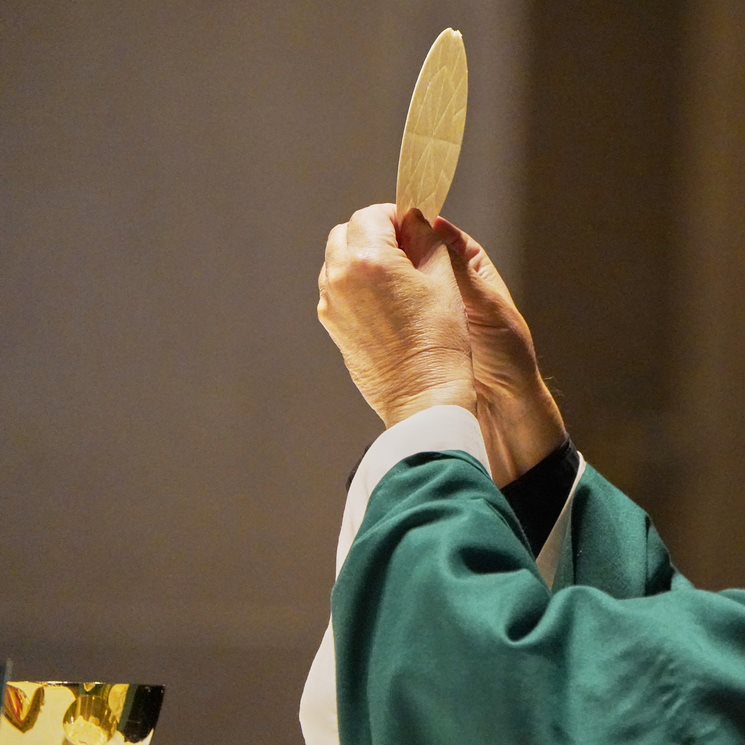
Catholicism is a language of its own, according to Father Dexter Brewer, pastor of Christ the King Church and Vicar General and Adjutant Judicial Vicar for the Diocese of Nashville, as he led the first night of the “Exploring the Eucharist: A Lenten Retreat in a Time of Eucharistic Revival” on Monday, Feb. 27, at Christ the King Church in Nashville.
Throughout the three-day retreat, sponsored by the Christ the King Women’s Council, Father Brewer takes attendees through an examination of the Mass, “its parts, historical origins, theological significance,” according to event materials.
The first evening focused on the beginning of the Mass through the Liturgy of the Word.
To begin, Father Brewer recalled the first time he ever attended a Catholic Mass. It was 1975, and Father Brewer, who had been raised Baptist, was invited by a Catholic friend.
“I remember being moved by the simplicity of it,” Father Brewer said. “It’s in four parts – opening rites, the Liturgy of the Word, one table, the Liturgy of the Eucharist, another table, and the closing rites.”
Everything in the Mass is a symbol, rooted in Scripture, he continued. There’s an elegance to it.
“When we gather in this place on Sundays or for daily liturgy, we come with all kinds of things on our minds,” said Father Brewer, but with the start of the opening rites, the faithful come together as a community as the opening song begins. “It’s really important this part and it’s important that we all gather in it to participate because we need to be formed as a single praying body.”
And as the opening song is sung, the procession begins.
“The opening song and the procession are an important part of us becoming a worshiping community,” Father Brewer said. “It is always Palm Sunday. Every procession is Palm Sunday because what we’re doing is we’re processing into this area where we celebrate the Lord’s sacrifice, his suffering, death, and resurrection here at this altar, and so the procession into Jerusalem, as it were, is the Palm Sunday procession.
“It is important to note that every action in the liturgy is connected to something,” he said. “The nature of symbols is to set your mind free to make association.”
Next, the priest reaches the front of the altar, genuflects, or bows, and then kisses the altar as a reverence to the person of Christ as well to continue the tradition of honoring the sacrifice of the martyrs.
“Catholicism is a language,” Father Brewer said.
After reverencing the altar and ending the opening hymns, the Mass begins with the sign of the cross, and the greeting “The Lord be with you,” to which the congregation responds, “And with your Spirit”. Then, comes the Penitential Rite, and the singing of the Gloria, he said, which all have roots in Scripture. Then, the celebrating priest reads the Collect.
“I said at the beginning that we come to this place on Sunday with all kinds of things on our minds. We worry about friends and family, we worry about ourselves, until the Collect,” he said. “The priest, in very few words, after inviting us to pray with him, tries to capture all that in just a few words. … It collects all the thoughts and hearts of the people.”
After breaking to sing two verses “May We See You”, Father Brewer ended the evening by addressing the Liturgy of the Word – the first reading from the Old Testament, the responsorial psalm, the second reading from the New Testament letters, and the Gospel.
“The Church says that the Scriptures when they are read, it is God’s voice,” Father Brewer said, noting how hearing different lectors reading the Scriptures throughout the weekend will often inspire a new thought on how God is working through his life. “The liturgy is alive. It’s alive. The Spirit is doing extraordinary things always.
“Something is happening, and it’s the work of the Spirit among us,” he said. “We have to breathe it in.”
The retreat continues with an examination of the Liturgy of the Eucharist on Tuesday, Feb. 28, and then Mass, a focus on the Blessed Sacrament, adoration and benediction Wednesday, March 1. Both evenings begin at 6 p.m. in the church.
The retreat is free, but RSVPs are encouraged. There is no requirement to attend all three evenings.
For more information or to RSVP, visit ctk.org/womens-council.









